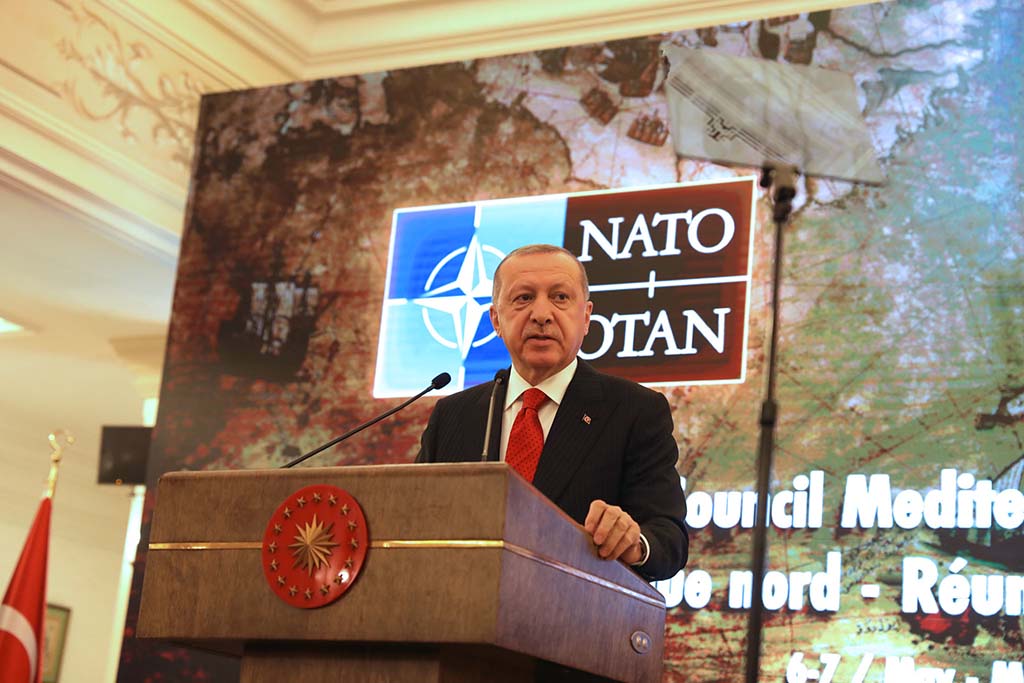After seven decades, Turkey’s relationship with its nominal American and European NATO allies appears fundamentally broken. And there is still plenty of room for it to get worse.
The current crisis in Syria is both a symptom and a driver of the breakdown. During the course of the Syrian civil war, Turkey and the US developed directly divergent interests in the region. Ankara was happy to watch as Islamic State destroyed PKK-aligned Kurdish forces against which it had fought for decades. Washington, by contrast, ultimately decided that working with these same forces was the most effective way to defeat ISIS. Ankara was understandably infuriated that Washington was arming and training its long-time enemy; Washington was understandably infuriated that Ankara was undermining the fight against ISIS.
In the Cold War, a strategic difference like this would have been less likely to emerge and easier to overcome. Both Washington and Ankara saw the Soviet-backed PKK, and Kurdish separatism more broadly, as a threat to NATO, putting the US unequivocally on Turkey’s side in the country’s existential conflict. And when other differences arose, the Soviet threat also gave both sides a reason to overcome their differences. Following the Turkish invasion of Cyprus, for example, the US Congress placed an arms embargo on Turkey. Yet the executive branch was happy to have the CIA, as well as European allies, try to work around it.
“Ankara is convinced that the global order is changing, becoming more multilateral, more transactional and less Eurocentric”
The end of the Cold War did not nec essitate the breakdown of the US-Turkish alliance, but certainly made it far more likely for cracks to emerge. Both allies’ threat perceptions diverged, and neither country felt the same over-riding need to avoid alienating the other. In Syria, suspicions and frustrations generated by a host of other disputes spilled over, making it all the more difficult for both sides to seek a middle ground. The involvement of the US-based cleric Fetullah Gülen in Turkey’s 2016 coup attempt intensified the conspiratorial conviction among many in Ankara that Washington was plotting against it, and led them to view US support for the Syrian Kurds in even more sinister terms. On the other side, a host of Turkish actions, from purchasing Russian S-400 missiles to arresting US citizens and consular employees, made it increasingly tempting for Washington to dismiss Turkish concerns.
Domestic considerations in both countries have also amplified the current crisis. Erdoğan derives political advantage and, it sometimes seems, real pleasure, from antagonising the West. Events like the 2018 attack on protestors in Washington’s Sheridan Circle, for instance, have left Erdoğan with a worse reputation in the US than other more repressive but less overtly antagonistic world leaders. At the same time, President Trump has played a particularly pernicious role by convincing Erdoğan that he can personally make all of Turkey’s bilateral problems go away. By refusing to implement sanctions on Turkey over the S-400 purchase and agreeing to withdraw US troops from Syria, Trump has helped confirm Turkey’s belief that it need not pay a price for alienating almost everyone else in America.
Turkey’s relationship with its partners in the EU has followed a similar, if not identical dynamic. While Washington remains the central target of Turkish conspiracy theories, Erdoğan believes that Western European countries are also working against him as well. He has also been equally effective in alienating public opinion across the continent, channelling the hostility of both the pro-Kurdish left and the Islamophobic right. While European leaders have not shown the same zeal for ignoring public opinion as Trump, they have also given Erdoğan reason to think that their self-interest will eventually lead them to accommodate Turkey. Particularly after the 2016 refugee agreement, Ankara appears convinced that it has important leverage over Europe. Indeed, any sustained political or economic crisis in Turkey would have serious spill-over in Europe, much more than in the US, making it harder for European states to credibly threaten sanctions in response to Turkish behaviour.
“Managing the current crisis will require both the US and the EU to walk a delicate line, showing Ankara they are willing to impose serious consequences without pushing this impulse to the point of being destructive or counterproductive”
Having given up on the possibility of a truly cooperative relationship with its former NATO partners, Ankara’s new strategic understanding envisions pursuing its interests by charting a more independent foreign policy. Ankara is convinced that the global order is changing, becoming more multilateral, more transactional and less Eurocentric. In this context, Turkish policymakers seek to build new relationships with countries such as Russia and China that will free them from their dependence on the US and EU. As demonstrated by Turkey’s military activities in the eastern Mediterranean and northern Syria, they are also increasingly committed to using hard power to force other countries to take Turkish interests into account.
This approach may prove effective for Turkey. But it could also generate a backlash from Washington and from EU capitals, ultimately contributing to a vicious cycle of deepening hostilities that serve neither side’s objectives. In the US Congress, Senator Lindsey Graham has introduced a bill which threatens wide-ranging sanctions in response to Turkey’s military operation in Syria, including visa bans on Turkish officials. Several NATO countries, including Germany and France, have already stopped arms shipments to Turkey. And the discussion of EU sanctions, already begun in response to Turkey’s energy exploration of Cyprus, has intensified. At a time when Turkey’s economy is already fragile, even relatively restrained sanctions could still have an outsized effect.
At the same time, Turkey’s push for a more independent foreign policy has also driven its regional isolation, bringing neighbouring countries together against it. Greece has successfully worked to capitalise on concerns over Turkey’s reliability as an ally to improve military cooperation with the US. Washington has also supported cooperation between Greece, Cyprus and Israel, all of which are increasingly framing their policies in terms of containing Turkey. Finally, in the Middle East, Turkey now faces concerted hostility from Egypt, Saudi Arabia and the UAE, which in addition to creating regional challenges will further complicate its relationship with Washington. This, of course, will only increase the temptation for Turkey to play a spoiler role, directly challenging Western interests and trying to break out of its newfound isolation.
Managing the current crisis will require both the US and the EU to walk a delicate line, showing Ankara they are willing to impose serious consequences without pushing this impulse to the point of being destructive or counterproductive. Given how hard this will be, American and European policymakers should also do their best to prepare for continuing tensions. This requires the US and EU to work together in order to work around the challenges posed by a more antagonistic Turkey.



